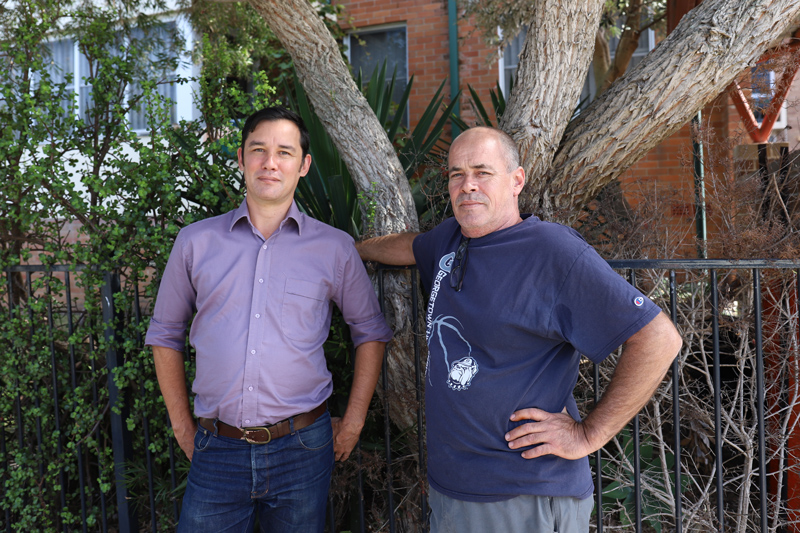David and Goliath: One tenant’s 14-year battle for repairs
10/05/2018

There can be no doubt that David Bott is a person with a keen sense of justice and a vast reservoir of determination.
David spent the last 14 years battling to get basic repairs done in his home. Finally, his landlord – the Department of Family & Community Services (FACS)1 – has made the necessary repairs, but only after FACS got dangerously close to being found in contempt of the NSW Civil and Administrative Tribunal (NCAT – the Tribunal). Thanks to David’s tenacity, his case has also paved the way for significant changes to the way FACS will deal with repairs issues.
David’s long-running legal battle in the Tribunal shone a light on a serious issue which public housing tenants know all too well: the systematic failure of FACS to do necessary repairs – even when ordered to do so by the Tribunal. In a damning decision handed down in Bott v NSW Land and Housing Corporation [2017] NSWCATCD 88, the Tribunal stated:
“There can be no basis for describing the long-standing and continuing breaches by the respondent [FACS - LAHC] of the several orders of this Tribunal as casual, accidental or unintentional.”2
The NSW network of Tenants’ Advice and Advocacy Services (TAASs), including the Tenants’ Union, has long recognised this problem. TAASs receive a huge number of calls from public housing tenants seeking help with repairs and maintenance issues. Over a two year period, TAASs gave approximately 1,500 phone advices about repairs in public housing – about 1 in 4 of all calls received from public housing tenants.3 TAASs have also helped numerous public housing tenants with their repairs applications – which have often been successful in the Tribunal. Sadly, these orders have sometimes been ignored by FACS.
In fact, FACS’s non-compliance with Tribunal orders has been so prevalent and persistent that, in David’s case, the Tribunal referred the matter to the Supreme Court of NSW. The Tribunal asked the Supreme Court to consider whether FACS was in contempt of court due to its failure to comply with orders over an extended period of time.4
Contempt of court is regarded very seriously within the legal system. Contempt is a wilful disregard for the authority of a court of law – it is behaviour that is illegal because it does not respect the rules of a law court. As the Tribunal stated in Bott v NSW Land and Housing Corporation (No 2) [2018] NSWCATCD 2:
“It is in the public interest to ensure that orders of a Court and Tribunal cannot be disobeyed with impunity, because this will impact upon the administration of justice generally, as well as depriving individual litigants from the benefits due to them.”5
The decision in David’s case in November 2017 prompted Michael Coutts-Trotter, Secretary of FACS, to write a detailed letter of apology to the Tribunal. This letter was then published in the Tribunal’s decision in March 2018. In the letter he acknowledges that “FACS’ conduct was entirely unacceptable” and also outlines a number of new procedures and steps being taken, “for improving the responsiveness and coordination across FACS in such matters.”6
The leaking roof, the crooked door, and the Tribunal orders
In May 2004, David Bott moved in to his apartment in South Coogee. He says there were many things to love about his new home:
“It’s a beautiful place to live – not far from the ocean – and there’s a good community in the complex. I was involved in the local tenants’ group for a while and got to know quite a few of the neighbours.”
However, like much of NSW’s public housing, the property has deteriorated over time. From the beginning, David noted that the place needed repairs:
“The leak in the roof was there when I moved in. I noted it in my condition report and raised it many times over the following 14 years. The leak led to mould and other problems. I had to pull up the carpet and polish the floorboards myself to get rid of the mouldy carpet. My kids were getting sick because of the mould.”
Despite repeated communication with his landlord, the leak continued, and in November 2004, David got a severe electric shock while he was having a shower – he was thrown across the bathroom and rendered unconscious!
Even then, nothing was done until February 2005, when FACS carried out some repairs – replacing the bath in the apartment upstairs. However these repairs did not fix the underlying problem, which was caused by a leak down a pipe from broken flashing on the roof.
Eventually, after several years of continued leaking and repeated repair requests, David made an application for repairs and compensation in the Tribunal. In 2009, he was partially successful: orders were made by consent – FACS agreed to carry out the necessary repairs and pay David $5,000 in compensation for economic and non-economic loss suffered as a result of their failure to repair the leak.
However, the repairs were still not done, and David returned to the Tribunal later in 2009 and again in 2010. David made the case that the repairs were still not done, and that FACS had not heeded recommendations made by the tradespeople who had attended and diagnosed the problem. The Tribunal once again ordered that the leak be repaired, but once again FACS did not comply.
Meanwhile, in 2010 the building had a fire safety upgrade, during which the wooden doors and door frames were removed. However the new door on David’s apartment was not installed correctly:
“My door didn’t fit the frame and the frame was actually slightly twisted. There was a gap of about four centimetres between the bottom of the door and the floor. It was insecure and also didn’t meet fire safety standards.”
David notified FACS of the need to repair the door, but they did not do so, and some time later he suffered a break-in:
“In 2015 I lost about $30,000 worth of stuff in a break-in. That break-in wouldn’t have happened if the door had been properly installed. I went back to the Tribunal again to try to get all the repairs done, and to seek compensation for the losses I suffered.”
David’s predicament was extremely frustrating, but he wasn’t willing to give up – he took his case back to the Tribunal. In October 2016 the Tribunal made orders in David’s favour regarding the repairs and a rent reduction. David also sought compensation for his losses – which were not awarded on a technicality. The Tribunal did order FACS to repair the main door, replace the security door, fix the leak, and repair damage to the walls and ceiling caused by the leak. These orders were reiterated in a decision on 3rd March 2017.
When FACS did not comply with these orders, David relisted the matter and again orders were made in his favour on 24th March 2017. These orders also included a backdated, and ongoing, rent reduction, and an order that FACS repay all the overpaid rent following the rent reduction. The Tribunal Member also made a referral to a Tribunal officer regarding the matter of the alleged contempt.
After getting some advice and assistance from Legal Aid and the Eastern Area Tenants’ Service (EATS), David decided to pursue the referral for contempt of the Tribunal.
FACS in contempt of the Tribunal?
By October 2017, FACS had carried out some work, but not all. The main door was fixed, but not the security door. A plumber had also inspected the roof – for the first time in the 13 year history of the matter! However no work had been done to fix the leak. Nor had any work been done to repair the walls or ceiling damaged by the leak. The rent reduction had been applied to David’s account, but not paid out to him as the Tribunal had ordered.
So in November 2017, David once again returned to the Tribunal to seek that the original Tribunal orders be enforced, and to put forward a strong case that FACS was in contempt of the Tribunal. David explains:
“It was the inequality that got me. I decided that I wouldn’t stand for it. Why shouldn’t a government department follow the Tribunal’s orders? So I dug my heels in. It wasn’t only about the repairs – it was about the double standard. FACS should have to comply with the law like everyone else.
“If you or I are found to be in contempt of court we can get locked up. But some government agencies think they’re immune, that they’re untouchable.
“I’ve seen so many of my fellow public housing tenants trying to get urgent repairs done and not being able to, even repairs that really affect their health. FACS often just patch and patch rather than fixing the problem. And it ends up costing more in the end.”
At the November 2017 hearing, the Honourable Judge F Marks ADCJ (Acting District Court Judge) was receptive to David’s argument and expressed his frustration with FACS’s ongoing non-compliance with Tribunal orders. In the decision, his Honour considered a number of legal issues, including the nature of contempt, how it relates to civil and criminal proceedings, whether FACS (as a government agency) is immune from contempt, and whether FACS’s behaviour could be considered ‘wilful disobedience’ of the Tribunal. Ultimately, his Honour decided that it was indeed proper to take the serious step of referring FACS to the Supreme Court of NSW. Judge Marks stated:
“The respondent [FACS] has been in breach of all of the orders of this Tribunal which are the subject of these proceedings for a considerable period of time, and remains in breach with respect to three of them, namely the failure to install a security screen door, the failure to apply the rent reduction orders and the failure to attend to the maintenance work in the toilet and adjoining bedroom.”7
“There can be no basis for describing the long-standing and continuing breaches by the respondent [FACS] of the several orders of this Tribunal as casual, accidental or unintentional. The several email communications to which I have earlier referred make it abundantly clear that there were persons within the respondent’s organisation who were aware of the orders of this Tribunal, and that they had not been complied with. In addition, the applicant [Mr Bott] continued to remind the respondent of its failures to comply with the orders, seeking further assistance from this Tribunal, and otherwise exhibiting saintly restraint. In these circumstances, it is appropriate to characterise the conduct of the respondent as capable of constituting deliberate omissions in defiance of the several orders of this Tribunal.”8
“I am comfortably satisfied on the balance of probabilities according to the Briginshaw standard that the conduct of the respondent [FACS] is capable of constituting contempt.”9
The apology

Within a month of this Tribunal decision, FACS had repaired the leak in David’s apartment, replaced the security door, and issued a cheque to cover the ordered rent reduction. David reports:
“Finally they did the repairs and I got a new door. It’s not coming down now – I reckon it’s bullet proof! Fixing the leak wasn’t even a big job in the end – the tradie just had to get up on the roof and replace the flashing around the downpipe. It took about half an hour – well, 14 years and half and hour!”
Even more significant was the written response from FACS Secretary Michael Coutts-Trotter delivered by hand on 20th December 2017. He wrote to apologise unreservedly to David and the Tribunal:
“The application that Mr Bott was obliged to bring in these proceedings has demonstrated that we failed in our obligations to him and to the Tribunal. We respectfully accept your Honour’s findings, which indicate that we remained in breach of some of the Tribunal’s orders, even at the time your Honour heard Mr Bott’s contempt application and made a determination to refer the Corporation’s conduct to the Supreme Court.
“FACS’ conduct was entirely unacceptable. It was unacceptable that Mr Bott was required to wait so long for repairs to be effected and to receive the refund due to him as a result of the rebate of rent ordered by the Tribunal. It was unacceptable that orders of the Tribunal were not complied with and that the resources of the Tribunal were wasted by repeated applications to obtain compliance. It was also unacceptable that the Tribunal was not adequately assisted by FACS as to the circumstances attending the matters raised by Mr Bott. The lack of cohesion and coordination between divisions of the Department was unacceptable and contributed to the delay in complying with the Tribunal’s orders.”10
The Secretary’s letter also reaffirmed FACS’s responsibility to respect the Tribunal, and to behave as a ‘model litigant’. Included in the Secretary’s apology was a copy of an email from the Secretary to all FACS staff that discussed the matter and firmly reminded staff that:
“If an order is made by NCAT for repairs, or to take other steps, that order must be implemented within the specified time. If for any reason it is not possible to carry out the order as required, and in the time required, the matter must be brought back before NCAT to seek a variation of the order.”11
Changing procedures and future possibilities
The FACS Secretary’s letter also outlined a series of new procedures aimed at ensuring that FACS will comply with all orders of the Tribunal in future. These new procedures include:
- Centralised monitoring of repairs issues in the Tribunal and orders made, through the new ‘NCAT Tracking Tool’ and ‘Critical Response Unit’
- An audit of all outstanding Tribunal matters
- Liaising more closely with the Tribunal to deal with emerging and outstanding issues
- An additional step prior any Tribunal hearing – the ‘Parameters of Negotiation’ – to document the viability and timeframe of the proposed repair works
- More prescriptive procedures for FACS staff, along with regular audits to ensure these procedures are followed and stronger oversight by senior staff
- Inspections by LAHC’s compliance team to confirm all works are carried out to an acceptable standard
- Establishing a continuous improvement committee to improve standards of service responsiveness
These new procedures sound very promising and should be cause for hope among the 112,000 public housing tenants in NSW. The procedures certainly demonstrate a strong and laudable commitment from FACS leadership to solving what has been a systemic problem. In David’s complex at least, there is already some sense that things are changing:
“The other day the service providers put on a BBQ in our common area and were listening to tenants and finding out about what repairs need to happen. I haven’t seen anything like that happen before. It’s a good step forward.”
Nevertheless, there are still a huge number of unresolved repairs issues waiting to be attended to. If you or a public housing tenant you know needs repairs, your first action should still be to call the maintenance line, or report the repair issue online if you are able to do so. Make sure you keep records such as notes or emails, and write down the job reference number. If you have an outstanding repairs order, contact your local Customer Service Officer to ask them to enforce the order. If you still find that the necessary repairs aren’t happening, get in touch with your local Tenants’ Advice and Advocacy Service. Don’t hesitate to make an application to the Tribunal if necessary (or a renew an existing application). Check out the Inner Sydney TAAS Repairs Kit for more info.
In part as a result of FACS’s apology and the steps taken to improve internal processes, the Tribunal decided in March 2018 to vacate its previous order.12 This meant that FACS would no longer be called before the Supreme Court to answer questions in relation to contempt. David says this was a disappointment for him, and he implored the Tribunal to uphold its previous orders in the hope of improving the accountability of public servants.
“The question of whether the government can be found in contempt is still open. I would have liked to have seen that really tested, and we didn’t quite get there. Maybe one day someone will take it further than I was able to.”
Nevertheless, there have been some great outcomes from David’s epic battle. His perseverance has brought to light a systemic issue and initiated a cultural change. David Maloney, Tenant Advocate at EATS said:

“Mr Bott came to the Eastern Area Tenants' Service for assistance on his contempt matter. We helped him get his documents together and assisted at the hearings. Thanks must also go to Tenant Advocate Martin Barker and Legal Aid solicitor Lindsay Ash for their efforts, and to Barrister Nick Eastman for his pro bono assistance.
"However the real achievement belongs to Mr Bott for his sheer determination to see the matter through. Even though I was disappointed not to see the referral make its way to the Supreme Court, the decisions in David’s case in November 2017 and March 2018 are worth their weight in gold for public housing tenants across the state.”
Based on his experience, David has some advice to offer other tenants:
“Legal processes can seem daunting. The government has deep pockets and will try to get you to give up.
“It’s a good idea to get some help from your local Tenants’ Advice and Advocacy Service, or from Legal Aid. But their resources are limited, so ultimately you’ll have to drive the process and do the work – especially gathering the evidence.
“The most important thing is to keep records. Write everything down – signed and dated diary entries are legitimate evidence. Take down the names of contractors and others who are involved and the dates and times they visit. They write down their version, so you need your version. You might have to use a few trees worth of paper, but it’s a must!”
“It’s also important to detach yourself from the legal process. The hardest thing is taking the emotion out of it. Otherwise it will consume you. It will bury you.”
“The Tribunal isn’t a monster. It’s actually quite fair. The Members are generally very helpful and good people. They’re used to having non-legal people involved, and they’ll help guide you if they think you have a case. But you’ve got to listen to them.
If you have any questions about repairs, the Tribunal, or other issues relating to your tenancy, call your local Tenants’ Advice and Advocacy Service.
Notes
1. Strictly speaking, the landlord of public housing tenants in NSW is the Land and Housing Corporation (LAHC) (previously known as the Housing Commission of NSW). Public housing is managed by ‘FACS Housing’ (previously known as Housing NSW and the Department of Housing). Both FACS Housing and the LAHC report to the Secretary of Family and Community Services (FACS). For brevity, this article generally refers to ‘FACS’ – since it is the overarching body which controls both the LAHC and FACS Housing. For more, see the FACS organisational chart.
2. At 62, in Bott v NSW Land and Housing Corporation [2017] NSWCATCD 88.
3. Tenants’ Union Submission to Public Accounts Committee Inquiry into the management of NSW public housing repairs and maintenance contracts, February 2016, page 4. See also Gemma McKinnon’s 2017 article, Tenants’ calls for safe public housing fall on deaf ears.
4. At 65, in Bott v NSW Land and Housing Corporation [2017] NSWCATCD 88.
5. At 5, in Bott v NSW Land and Housing Corporation (No 2) [2018] NSWCATCD 2.
6. Letter of apology, at 8, ibid.
7. At 58, in Bott v NSW Land and Housing Corporation [2017] NSWCATCD 88.
8. At 62, ibid.
9. At 63, ibid.
10. Letter of apology, at 8, in Bott v NSW Land and Housing Corporation (No 2) [2018] NSWCATCD 2.
11. Email to FACS staff, at 10, ibid
12. ibid.
Click here to download this story as a printable pdf – Tenant News bulletin




